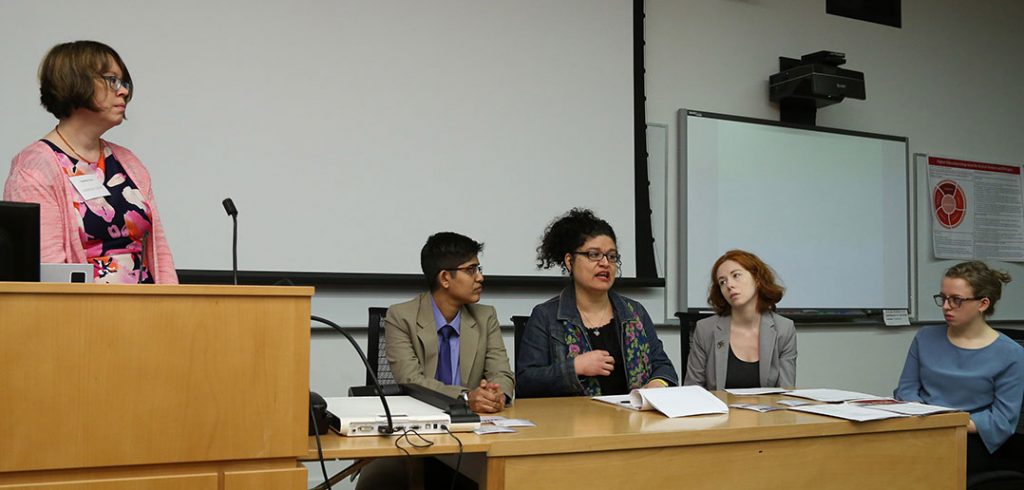“I was persecuted for my sexual orientation, so I came here for a chance at a better life,” said Rosario, wearing a suit and tie. “I could never dress this way or be who I am. I was shamed, couldn’t live my life, and could never sleep. One thing that is ignored is the mental health of asylum seekers and the mental stress they have experienced before [coming here]. It puts you in a shell.”
Rosario was among the asylum seekers who shared their personal stories at Fordham’s “Women and Girls on the Move,” a March 16 event sponsored by the Graduate School of Social Service (GSS) and held in conjunction with the United Nations 63rd Commission on the Status of Women.
The conference, which brought together educators, politicians, social workers, health care providers, lawyers, and students, came at a time when nearly 80 percent of the 68.5 million refugees, asylum seekers, and stateless and displaced persons documented in the last fiscal year are women and young people; 52 percent are children under 18.
Held at Fordham Law School, the conference aimed to shine a light on the intensifying struggles of women and girls who are fleeing their homes in the midst of violence, persecution, and disaster. The organizers hope to use this knowledge to better help others who are also seeking new lives.
And the time for new solutions is now, presenters said. One person is displaced from their home every two seconds, noted Sandy Turner, Ph.D., director of the GSS Institute for Women and Girls, which presented the conference with the International Health Awareness Network (IHAN).
In addressing the U.N. event’s theme—social protections and public services—the conference also highlighted displaced women and girls’ limited access to health care, education, justice, and humanitarian protections throughout the process of migration and resettlement.
“This is about finding solutions to the global migration crisis,” said Sorosh Roshan, M.D., IHAN founder and president.
A panel discussion featured several women, including Rosario, who represented different communities of asylum seekers.
Mahnaz Sarachi, Ph.D., Executive Director of IHAN, said it’s important to understand the different kinds of people in crisis. “Why are they moving?” she said. “They are in search of a better life… they have left their homes to seek safety.”
A Hard Adjustment
Anna Elvira Brodskaya, an LGBTQ and asylum-seeker rights activist, left Russia, where there is a homophobic culture and the LGBTQ community is often victims of violence. In New York, job opportunities were few.
“Women are not perceived as good enough for decent jobs like ones requiring strength,” she said. “You face harassment and you can do nothing about it, because you are undocumented and you have no rights.”
Rosario spoke of how her life here was initially weighed down by locating affordable health insurance, housing, and health care. “Living in New York is expensive, so you might have to live on the street,” she said. “Yes, there are shelters, but they are not always safe.” Now, thankfully, life has improved for Rosario; she has a wife and is writing a book.
Julia Gagliardi, FCRH ’19, of the Social Innovation Collaboratory at Rose Hill, delivered a moving narrative that was created from a collection of stories from resettled students attending colleges and universities in New York City. “On my own, I had to apply for health insurance outside of my university, because I was not eligible, and pay for it at a higher cost,” shared Gagliardi, quoting a student. “On my own, I had to look for ways to finance my tuition, because I was not eligible for financial aid or scholarships. On my own, I had to meet with a lawyer several times a week to apply for a work permit. On my own, I was connected to an independent donor who heard my story and helped fund part of my tuition.”
Ideas and Suggestions
Discussion led to ideas about how universities can create safe spaces.
Brodskaya suggested schools could offer free courses to women new to the U.S. about career options. “They need to be enlightened about the possibilities … they can be employed not just as nannies and cleaners,” she remarked.
Panelists suggested college campuses would be a safe space to learn about U.S. procedures impacting migrants. “Many are now afraid to apply for asylum,” said one.
They also agreed that universities might help the public understand migrants’ lives.
“We could incubate goodwill on campuses,” said Gagliardi, an English and sociology major.
New Challenges
The conference also featured dialogue about what migrants entering the U.S. are facing, including word that the accepted number of refugees entering the country has been lowered.
Frank Kearl, J.D., LAW ’18, spoke of a “walled prison facility” in Dilley, Texas, where migrants are being held in poor conditions.
Although there are lawyers and advocates helping women and children in Dilley, more volunteers are needed, he said.
“These people are sick, they are scared, and they have no idea what is going to happen to them until a volunteer sits down with them and tells them,” said Kearl, a Workplace Justice Legal Advocate at Make the Road New York. “It’s disgusting what is happening now.”
–Meg McCaffrey

